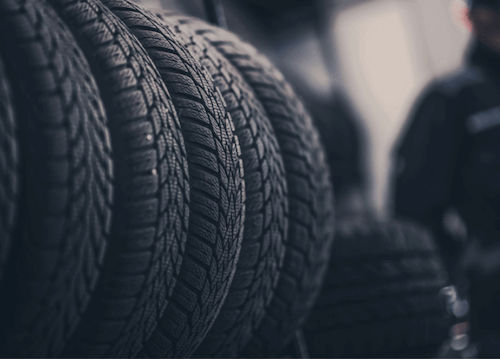Everything You Need to Know About Tire Seasons
Auto Shops Located in: Chapel Hill, Durham, Taleigh, Apex, and Cary North Carolina

Tire Seasons Explained
When it comes to buying new tires, much of the terminology can be hard to navigate. One particular source of confusion is tire seasons. This term refers to various tire compositions, each of which is best suited for a different road condition and climate. There are four popular tire seasons: summer (performance) tires, winter tires, all-season tires, and all-weather (all-terrain) tires. Here is a quick guide to tire seasons from the local experts at Chapel Hill Tire.
A Guide to Summer (Performance) Tires
Often created with asymmetrical tread patterns, maximum road-holding capabilities, and agility features, summer tires help boost road performance and handling—which is why they are often referred to as “performance tires.” They also feature siping (a tread term for grooves that help tires manage heat and water). As such, performance tires are well-equipped to handle the summer’s wet road conditions and hot asphalt.
Summer Tires: Benefits and Considerations
Before deciding on summer tires, there are a few benefits and considerations that you may need to balance. The soft rubber mixture in summer tires is well suited to manage high road temperatures and friction. Once the temperatures drop below roughly 45 degrees, this rubber hardens—decreasing traction and performance to an unsafe level. This is why summer tires should only be driven in ~45-degree weather or warmer.
Many drivers who opt for summer tires need to have a second set of all-season tires, winter tires, or all-weather tires to swap out once the temperatures are getting colder.
Performance Tire Costs
Additionally, summer tires include performance-boosting features that can take manufacturers more to produce. If you are buying on a tight budget, performance tires can come with a higher price tag when compared to more standard tires, such as all-season variants.
A Guide to Winter Tires
Characterized by their deep tread marks, winter tires are designed to promote safe, controlled driving in inclement weather. They use deep tread to overpower slush and collect snow. While collecting snow may sound like a road hazard, this can help connect the tread to the asphalt surface. In deep snow conditions, this process creates snow-on-snow traction, allowing safer and more controlled handling in severe weather. If your area frequently endures icy climates, you can also find winter tires with studs on them for ice traction.
Winter Tires: Benefits and Considerations
Much like summer tires, winter tires contain some unique considerations. The rubber mixture of winter tires is designed to stay flexible and improve traction during inclement weather. However, this rubber mixture does not manage heat well. While you *technically* can drive winter tires in the summer (that is to say, it does not pose the same level of safety risks as summer tires in the winter), this will quickly wear out your tire set. Extended exposure to warm weather will tear away at your winter tires and begin to slow your reaction time and handling. Winter tires are ideally only driven in conditions of ~45 degrees or below.
Winter Tire Costs
Much like summer tires, this specialty rubber and thick tread can cost manufacturers more to produce. As such, winter tires can also cost a little more than standard all-season tires.
Winter Tires: Buy While You Can
It is also helpful to note that winter tires can abruptly become high-demand entities. If you are thinking about buying winter tires, you should consider doing so before the weather becomes severe. Once the snow starts falling, winter tires may become harder to find.
A Guide to All-Season Tires
Perhaps the most popular tire options, all-season tires were likely what you found on your car when you bought it. As the name suggests, all-season tires prepare you for mild climates associated with all seasons. The rubber composition and design makes these tires suitable for a variety of road conditions—including wet or dry asphalt and a comprehensive temperature spectrum.
All-Season Tires Benefits and Considerations
It is important to note that while these tires are versatile and designed for safety, they are not specifically intended to encounter any severe weather. For example, they will not counteract hydroplaning like all-weather tires or manage snowy roads like winter tires. However, unless you live in an area with frequent severe weather, these tires should suit your general driving needs.
All-Season Tires Costs: Affordable, Low Tire Prices & High Fuel Efficiency
All-season tires are ultimately known for their cost-efficiency for two reasons: first, all-season tires can feature an improved fuel economy. This is because all-season tires have a low-rolling resistance. Fuel economy can be influenced by a wide variety of factors, including tire inflation, tire age, tread levels, tire size, and more.
The high-engagement tread of winter, summer, and all-weather tires can help improve performance and handling, but it also creates some resistance against the road. A certain degree of resistance is always necessary for tire safety and efficiency. However, all-season tires have a balanced mixture of safety and grip without the same level of resistance, leading to less fuel usage. Second, because they do not contain any of the same unique features, all-season tires are also often associated with lower upfront prices than specialty tires.
A Guide to All-Weather (All-Terrain) Tires
While the name may sound similar, all-weather tires are somewhat of the opposite of all-season tires. Rather than managing all mild climates, these tires help prepare you for all weather extremes, including both heavy rains and snowfall. They have thick tread and a rubber mixture that can help manage everything from hydroplaning to improved ice traction.
All-weather tires are also often called “all-terrain” tires (and vice versa). If you are going off-roading or adventure-seeking, these tires are for you. These tires are highly versatile and safe year-round. As you might have figured out by now, these features can cost a little extra, including a lower fuel economy and a higher price tag.
Chapel Hill Tire | Affordable Tires Near Me
When you are due for a new set of tires, Chapel Hill Tire is here for you. Our online Tire Finder tool sorts available tires for your vehicle based on your preferences, including tire season. Chapel Hill Tire ensures that you get the lowest price possible on your tires by offering our Price Beat Guarantee. If you find a lower price elsewhere, we will beat it by 10%.
We proudly serve drivers from our
8 convenient locations between Raleigh, Chapel Hill, Durham, and Carrboro. The Chapel Hill Tire customer base extends to nearby cities like
Wake Forest, Clayton, Garner, Knightdale,
Pittsboro, and beyond. The Chapel Hill Tire experts are here to help you find the right tires for your vehicle, driving style, and budget. Experience industry-leading service and low prices when you
buy your tires online or in-store today from Chapel Hill Tire.















